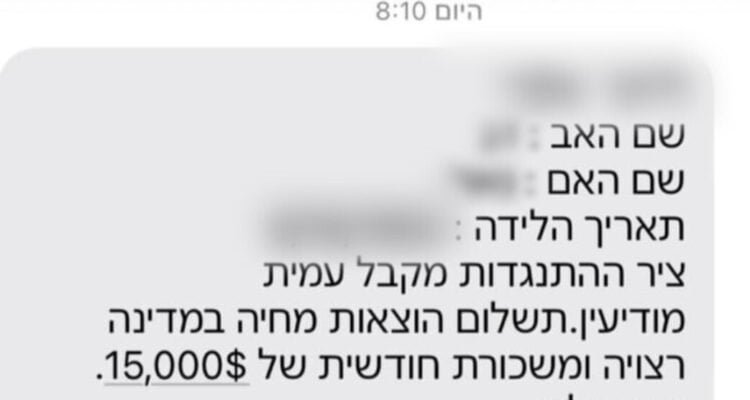“How did they know my name, my parents’ names, and phone number?” asked the Israeli woman.
By World Israel News Staff
An Israeli residing in the central district received a disturbing SMS (text message) allegedly sent by Iranian agents, which included personal information about the recipient and offered her $15,000 to spy on behalf of the Islamic Republic.
Speaking to Hebrew-language outlet Mako, the woman – identified only be her first initial, A – recently received a message which began by stating her name, parents’ names, and her birthday.
“The Axis of Resistance [a name for Iran and its proxy groups in the region] are looking for [those willing to share] intelligence. Living expenses in the country of your choice and a $15,000 monthly salary. Reach out to us.”
“I don’t understand how they got my phone number. How did they know my name and the name of my parents?” asked A, who remains unsettled by the message.
“I immediately blocked the sender and filed a complaint with the police,” she said.
According to Mako, Iran likely obtained the woman’s personal information in one of several recent hacks of Israeli databases by cyber-criminals from the Islamic Republic.
In recent weeks, the Shin Bet announced that dozens of Israelis – nearly all recruited over the social media platform Telegram – had knowingly spied for Iran in exchange for payment.
Most of those involved were born in former Soviet bloc countries, though a number were also Israel-born.
A senior police official said that news about Iranian spy rings in Israel had raised public awareness about the issue.
“There are a large number of phone calls from citizens reporting that they have received offers from Iran to spy,” a senior police official told Mako.
Israelis “understand the seriousness of the matter, are not tempted to cooperate, block the senders, and report the messages to police in real time. This is incredibly important, helping us identify agents or find those they’ve already managed to recruit.”




